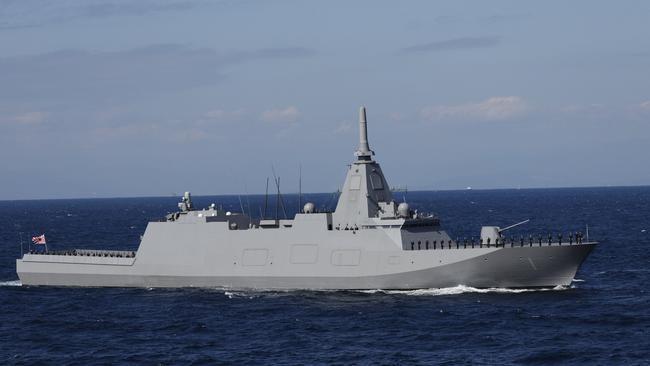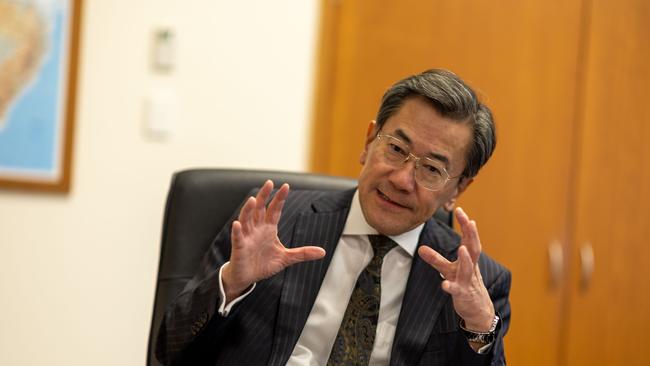Former envoy makes ‘strategic case’ for Japanese frigate
Former Japanese ambassador Shingo Yamagami has urged Anthony Albanese to prioritise the nations’ ‘quasi alliance’ by choosing his country’s Mogami frigate.

Former Japanese ambassador Shingo Yamagami has urged Anthony Albanese to prioritise the nations’ “quasi alliance” by choosing his country’s Mogami frigate ahead of its German rival for a new $10bn warship contract.
The Mitsubishi Heavy Industries ship has emerged as the early favourite in the race to supply 11 new general purpose frigates for the Australian navy, with an array of experts saying the Japanese bid offers major strategic advantages.
It also carries serious risks, given Japan has never exported a warship or built one outside the country, which it will be required to do if it wins the tender.
Mr Yamagami said Australia and Japan were natural partners in the Indo-Pacific contest with China and called on the government to heed the “bitter lesson” of the Attack-class submarine decision when the Coalition reneged on a tacit commitment to go with a Japanese boat.
Germany’s TKMS is pitching its MEKO A-200 as the low-risk option, pointing to its experience in delivering Australia’s Anzac-class frigates in what’s regarded as the nation’s last trouble-free shipbuilding project.
The government has banned both shipbuilders from spruiking their vessels in the media, while the Japanese and German embassies have been warned against publicly commenting on the tender process.
Mr Yamagami, a former head of Japan’s intelligence service, said he felt compelled to speak out on the issue because Japan was unused to promoting its hardware to international buyers.
He urged “political attention at the highest level” on the strategic advantages of the Japanese bid. “Japan is one of Australia’s closest security partners. Some might call us quasi allies, but in fact we are allies in all but name,” he said.
“Germany is an important security partner, both to Australia and to Japan but it’s not a resident power in the Indo-Pacific.
“Australia going with MHI would carry us a long way in advancing the special and strategic partnership between our two countries.”

Mr Yamagami, whose term as ambassador was cut short amid Labor frustration at his hawkish public comments on China, made a similar pitch in a closed-door speech in Melbourne last month.
He said Australia needed to avoid a repeat of its ill-fated Attack-class submarine contract, which Tony Abbott had indicated would go to Japan but was granted to France’s Naval Group before the program collapsed.
“The bitter lesson of the failed effort to make Soryu submarines a symbol of strengthened co-operation should never be forgotten,” Mr Yamagami told the exclusive Athenaeum Club.
“Careful attention is warranted to avoid a second disappointment in the ongoing consideration of Mogami-type frigates of Mitsubishi Heavy Industries.”
Defence Minister Richard Marles announced last month that the contest to build the new ships to replace the navy’s ageing Anzac frigates was down to MHI and TKMS, following the elimination of South Korean and Spanish competitors.
The first three vessels will be built in either Japan or Germany, with the first to be delivered this decade, and the rest built at Perth’s Henderson shipyards.
Fast production schedules, the ability to build and sustain the ships in Australia, and interoperability with Australian and allied weapons systems will be among key assessment criteria.
The US Studies Centre’s Peter Dean said: “TKMS has far more experience in this space but a partnership with Germany does not offer anywhere near the strategic advantages one with Japan does.”
Former Defence official Michael Shoebridge said selecting the Mogami would open up a new era of defence co-operation with Japan. “The frigate program is certainly about getting capable warships into our fleet as fast as possible, but it’s also an enormous opportunity to put real operational and technological heft into the Australia-Japan strategic partnership,” he said.
The Australian Strategic Policy Institute’s Euan Graham said unless the German ship had a “a very clear capability edge” then the strategic case for the Japanese vessel should take priority.
The government is insisting on a proven design without modifications, but Japan has indicated it wants to sell its yet-to-be-built upgraded version of the Mogami to Australia.
TKMS had offered its next-generation MEKO A-210 but reverted to its in-production A-200 based on the government’s request for an “off-the-shelf” model.
The Mogami has a stealthy design and requires just 90 crew to operate, compared to 120 for the German ship. Defence industry sources have questioned whether the Japanese ship’s smaller crew would be appropriate for the marathon deployments Australian warships are required to undertake.
There have also been suggestions the Mogami’s combat system would need to be overhauled for Australian use because of its Japanese language interface, and that the ship’s bunks may be a tight squeeze for taller Australian sailors.




To join the conversation, please log in. Don't have an account? Register
Join the conversation, you are commenting as Logout